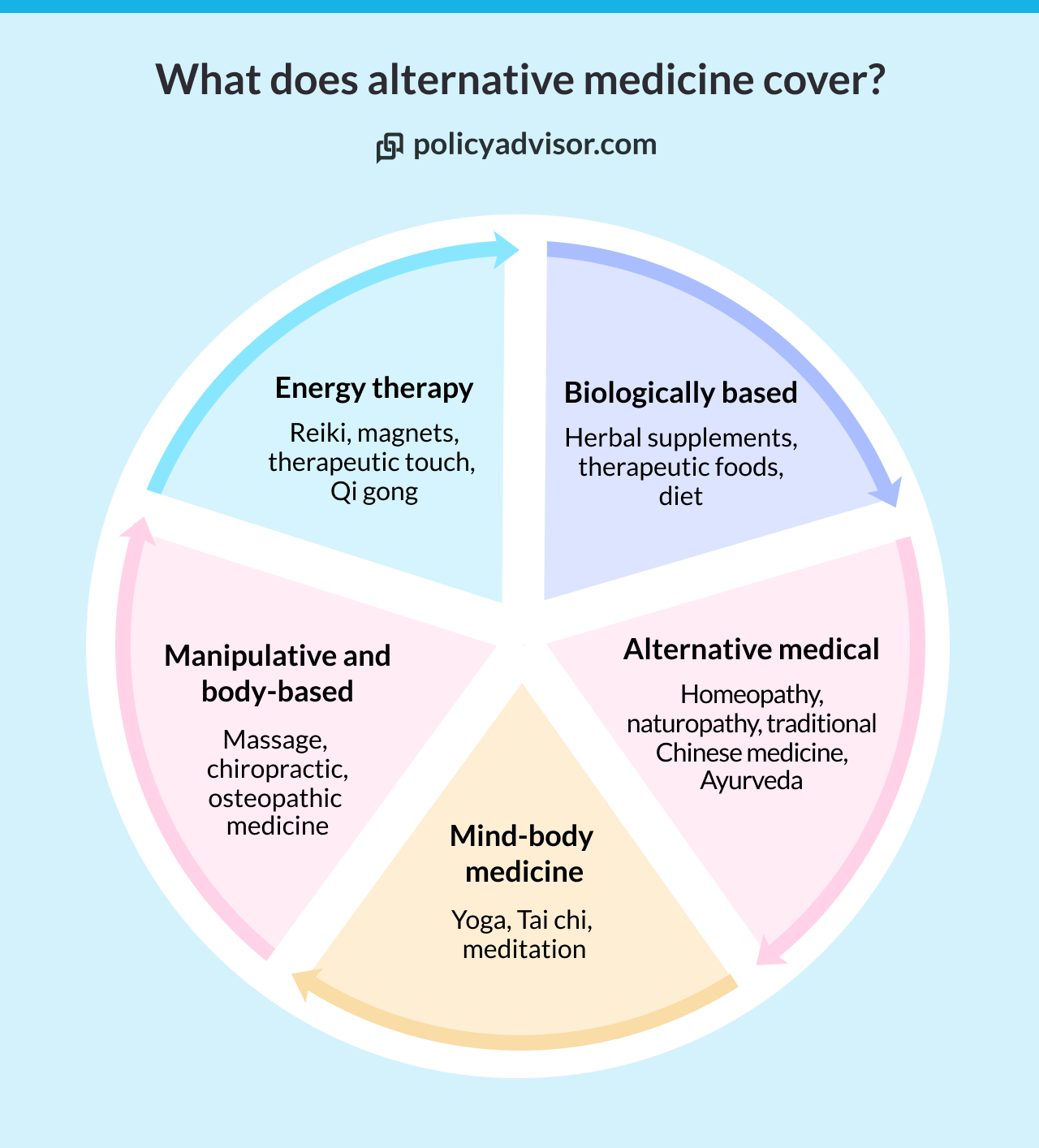- Alternative medicine, like chiropractic, acupuncture, and naturopathy, is popular in Canada, with 56% of Canadians using at least one Complementary and Alternative Medicine therapy
- Common Complementary and Alternative Medicine therapies include acupuncture, chiropractic care, naturopathy, massage, homeopathy, and energy therapies like Reiki
- Private insurance often covers some alternative treatments, but coverage and reimbursement vary by provider and policy specifics
- Insurance companies like Sun Life and Blue Cross may cover some Complementary and Alternative Medicine therapies through wellness programs or health spending accounts
Alternative medicine is growing among Canadians, who often seek these therapies alongside conventional medical treatments. Many people report using complementary and alternative medicine (CAM) for various reasons, including chronic pain management, stress relief, and overall wellness.
Most of these alternative medicines are not covered by provincial health insurance plans, leading to an increased reliance on private insurance or out-of-pocket payments.
However, coverage can vary widely depending on the provider and policy. In this blog, we will look at alternative medicine, alternative medicine examples, what is covered, and what you should know when considering these treatments in your healthcare plan.
What is alternative medicine?
Alternative medicine includes a wide range of medical practices that are outside the realm of conventional Western medicine or are not part of the main healthcare. These treatments emphasize natural methods, often focusing on the mind-body connection, holistic care, and personalized approaches.
Unlike mainstream medicine, which focuses on treating symptoms through pharmaceutical drugs or surgery, alternative medicine typically looks at the whole person, including lifestyle, emotions, and overall wellness.
Many people turn to it for a more holistic approach to health or when conventional treatments are not giving the desired results. As per the study by the University of British Columbia, 56% of Canadians used at least one CAM therapy. While it’s not a replacement for all medical care, alternative medicine can complement mainstream approaches effectively.
What falls under alternative medicine?
Alternative medicine or complementary and alternative medicine (CAM) includes a wide range of health care practices, ranging from homeopathy, acupuncture, massage therapies, chiropractic treatment, and more.
Here’s a list of some of the most popular alternative medicine practices in Canada:

Are naturopathic doctors covered by insurance in Canada?
Yes, naturopathic doctors (NDs) in Canada are generally covered by extended personal health insurance plans. Most private insurance plans will reimburse part of the cost for naturopathic services, typically between $300 and $500 a year.
While provinces like Ontario and British Columbia regulate naturopathic doctors, naturopathic visits aren’t covered under public health insurance. You might still have some out-of-pocket costs, like co-payments or deductibles, depending on your plan.
Does health insurance cover chiropractors?
Yes, private health insurance in Canada covers chiropractic care as a part of extended health care plans. Most plans include chiropractic care as part of their paramedical services, with nearly 70% of Canadians having coverage (as per the Canadian Chiropractic Association).
Is acupuncture covered by health insurance?
Yes, many insurance plans offer coverage for acupuncture treatment to treat chronic pain but it varies depending upon the province, insurance plan and the provider. Extended health plans provided by companies like Sun Life, Manulife, and Blue Cross offer some level of acupuncture coverage.
Is homeopathy covered by health insurance?
Yes, most private insurers offer partial coverage for homeopathic treatment under extended health care plans. However, the coverage varies depending on the terms of each plan.
If your insurance plan covers homeopathic treatments, it is advisable to submit your treatment receipts to your provider for reimbursement. If your insurer does not cover homeopathy, you may try contacting the provider to include homeopathy in your plan.
Is ayurvedic treatment covered in health insurance?
In Canada, coverage for ayurvedic treatment really depends on your insurance provider and specific plan. Most standard health plans don’t cover it, but some extended health benefits might.
Certain parts of ayurvedic treatment, like consultations with certified or regulated naturopaths or holistic practitioners, could be included if your plan covers those types of providers. It’s best to check directly with your insurance provider to see what’s covered.
Is Reiki covered by health insurance in Canada?
Standard health insurance usually doesn’t cover Reiki. However, some health insurance companies like Blue Cross, Canada Life, and Green Shield cover reiki massages. It’s a good idea to check with your insurance advisor if you’re specifically looking for a plan that includes Reiki coverage.
Does OHIP cover alternative medicine?
In Ontario, the Ontario Health Insurance Plan (OHIP) doesn’t cover most alternative treatments, including those from naturopathic doctors, chiropractors, osteopaths, and massage therapists. For these services, you’ll need to either pay out-of-pocket or see if your private health insurance offers coverage.
How much does alternative medicine cost?
The cost of alternative medicine in Canada varies widely depending on the type of therapy. Canadians spent significantly on complementary and alternative medicine (CAM).
Let’s look at the costs of treatments covered under alternative medicine:
Health insurance companies that cover alternative medicine
Manu Life, Sun Life, Canada Life, and Blue Cross are some of the companies that provide alternative health medicine as a part of their extended health benefits program or through health spending accounts. Below are the companies that provide alternative medicine:
| Company name | Alternative therapies covered |
| Manulife | Acupuncture, chiropractic care, dietitians, osteopaths, podiatrists, naturopaths, massage therapy |
| Sun Life Financial | Acupuncture, chiropractic care, speech therapy, massage therapy, naturopathy, homeopathy, ayurveda, herbal medicines, reiki |
| Blue Cross | Acupuncture, massage therapy, chiropractic care |
| Canada Life | Chiropractic care, acupuncture, naturopathy, physiotherapy, psychology, massage therapy, speech therapy |
Does health insurance in Canada cover aromatherapy?
Though alternative and complementary therapies like aromatherapy are not uniformly covered across private insurance plans, some extended health plans may offer aromatherapy as a part of their wellness benefits if the services are provided by licensed or registered practitioners.
Factors affecting coverage for alternative medicine
In Canada, coverage for alternative medicine varies a lot, and it usually depends on your insurance plan, the insurer, and the type of alternative treatment. Many private insurance plans cover popular options like acupuncture, chiropractors, and naturopathy, but the extent and limits of this coverage differ.
Explore your options for comprehensive alternative medicine coverage
Discovering the right alternative medicine coverage can open up options for a more personalized approach to health. At PolicyAdvisor, our licensed insurance experts are ready to guide you through the range of health plans available from Canada’s top providers.
Whether you require coverage for acupuncture, chiropractic care, or naturopathy, our experts will help you find a plan that supports your wellness journey. Also, you can get access to free instant quotes, competitive pricing and lifetime after-sales support for a smooth buying experience.
Book a quick call with one of our advisors today, and let’s chat about the coverage options that best fit your needs.
Frequently asked questions
What is the most common form of alternative medicine?
Acupuncture is one of the most popular types of alternative medicine. It involves putting thin needles into specific points on the body to relieve pain and promote healing.
It’s well-known, and some insurance plans cover it for certain conditions, making it a popular choice for people interested in alternative options.
Are there any drawbacks of alternative medicine?
Certain drawbacks of alternative medicine include a lack of rigorous scientific research backing many treatments, potential safety concerns, and the risk of delaying conventional medical care. Some alternative methods can also interact negatively with standard medical treatments.
Why is alternative medicine not covered by public health care?
Alternative medicine often isn’t covered because it lacks the same clinical trials that support conventional treatments.
Many alternative therapies are based on traditional practices rather than scientific proof. This makes healthcare providers and insurers skeptical about their safety and effectiveness.
Alternative medicine is on the rise in Canada, with 56% of Canadians using complementary therapies like acupuncture, chiropractic care, and naturopathy. While public health insurance often excludes complementary and alternative medicine (CAM), private plans from providers like Manulife and Blue Cross offer some coverage for these treatments.






